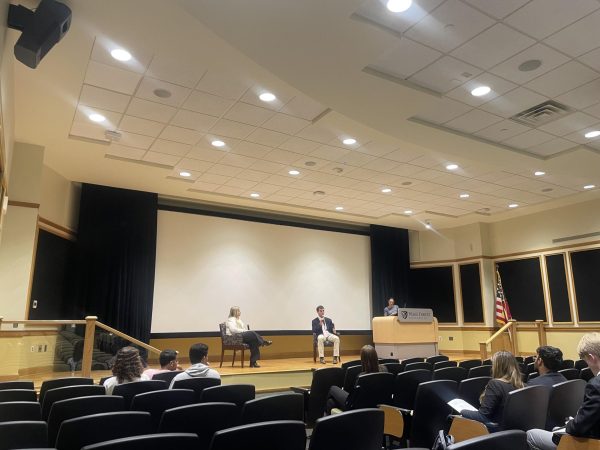Students exult in first spring break since 2020
Classes resume this week after the first spring break WFU has had since the pandemic
From left to right: Charlotte Calder, Grace Aronofsky and Jack Bradley enjoy their spring break in Miami.
March 15, 2022
Last week, Wake Forest students had their first spring break since 2020. Campus remained open and accessible to those who wished to remain on campus, but students were given the opportunity to leave campus and take a break from academic life.
Due to the ongoing pandemic, Wake Forest has been unable to hold a formal spring break since 2020. In 2020, students left campus for what they thought would only be a week-long spring break, only to not return to campus because of COVID-19. Wake Forest continued its classes remotely for the remainder of the semester. In 2021, because of the delayed start to the semester and to prevent students from traveling and being exposed to COVID-19, the university did not offer a spring break. Instead, only two rest days were given off the entire semester.
Residential Advisor and sophomore Anabel Ford explained the toll the lack of rest took on her mental health.
“Last year, I had to go home for a few weeks because my health was so bad,” Ford said. “I had no break and no time to stop and recharge, which is when our brains are best at solving problems we can’t figure out otherwise.”
Freshman Thomas Peterson also expressed his desire for a period of rejuvenation.
“I’m pumped for the time to myself because you don’t get a lot of that during school,” Peterson said. “I will be refreshed and ready when I return to the chaotic cyclone that is college next week.”
Not only does spring break provide students with rest, the week off of classes allows professors the chance to step away from the classroom as well. Professor Alyssa Howards noted this fact and explained the noticeable change on campus after spring break.
“Even if students don’t travel, I think spring break is an important time to press the ‘reset’ button — this applies to both students and faculty,” Howards said.
She continued: “Also, for me, it’s always been an important transition from winter drudgery to summer. Everything after break always seems so different — the campus is in bloom, it’s warmer, people are happier. It’s amazing how this all happens in the span of 10 days. I think all of this adds lightness and joy to the campus, and certainly, that can help us all with our work and mental health.”
Prior to spring break, snow days and the recent Weaver fertilizer plant fire affected students’ ability to establish and maintain a regular routine.
“I absolutely think this semester has been abnormal, especially because of the snow and fire days off,” Ford said. “It’s caused me to struggle to find a routine or groove that I can get into, which always makes my mental health devolve a bit.”
Because of the lack of routine and abnormal schedule, students have admitted a stronger sense of academic burnout leading up to spring break. When asked about her level of stress and academic stamina, freshman Ellie Howell noted that her course load has caused an increase in burnout.
“I have definitely gotten burnt out this semester,” Howell said. “I am taking 17 credit hours, and every class seemed to ramp up at the same time. These past two weeks have been very challenging, and there are times when I have to take a break simply because my brain can’t function anymore.”
When asked about the effects of COVID-19 on his students and the absence of a mid-semester break, Professor John Welsh praised his students for their openness to express their exhaustion and sometimes even their lack of motivation in college.
“One of the greatest strengths of this generation of students is their willingness to speak openly about mental health,” Welsh said. “Since the pandemic, the increase in the number of students who speak to me about mental health issues has been remarkable — astonishing even,” Welsh said.
Alongside being honest with professors about a shift in morale, students offered advice to their peers regarding academic burnout.
“Some advice for my peers would be to not be afraid of taking time off, even if it’s for 15 minutes,” Ford said. “If you have been staring at an assignment for what feels like hours with no solution in sight, take a break. Go for a walk, eat a snack, recharge your brain. Burnout is real and affects everyone in different ways. Use your extra time to aid yourself in that way.”























